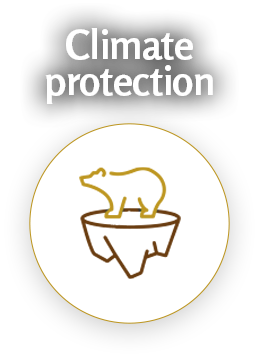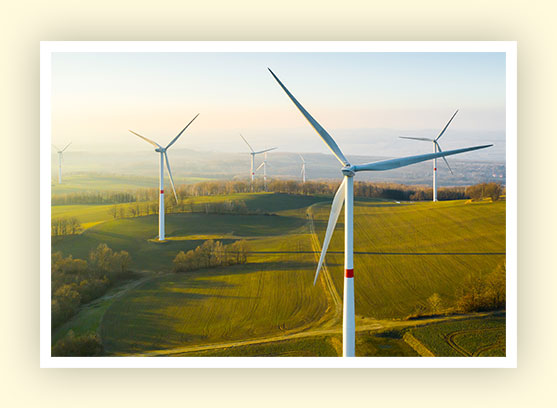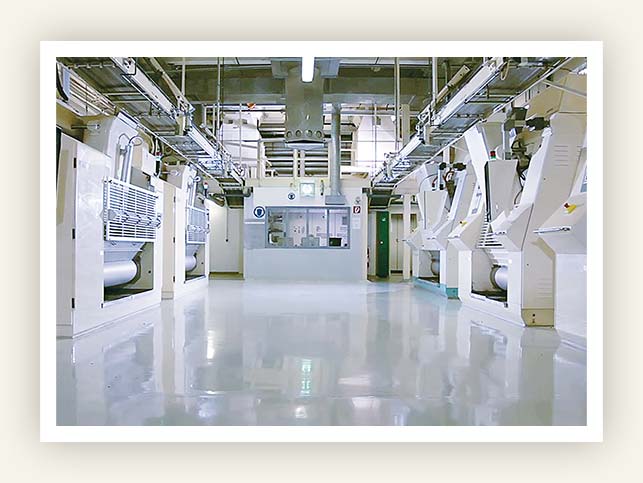This is why climate protection is important
Many things in life impact the climate. The manufacture of products consumes energy. This energy is partly generated from fossil fuels. This produces carbon dioxide, or CO2. Carbon is a greenhouse gas. It increases the greenhouse effect when it enters the atmosphere. As a result, it contributes to global warming and, thus, to climate change. That is why it is essential to reduce carbon emissions and capture the carbon already in the atmosphere.

First successes: energy management, green electricity
First successes: energy management, green electricity, and climate-neutral production of our domestic brand-name products
At our plants, we work with energy management systems to reduce energy input and, thus, carbon emissions. We also use predominantly green electricity there and work with an efficient combined heat and power plant at our Saarlouis and Saarwellingen sites.


Our objective: climate neutrality for Ludwig Schokolade (scope 1 and 2 emissions) by 2040
Our long-term objective is to achieve climate neutrality for Ludwig Schokolade (scope 1 and 2 emissions) by 2040. We are currently working on this complex task. The first step is the initial calculation of the carbon footprint to reveal reduction potential and to document emission reduction. Since 2020, the entire KRÜGER GROUP has been balancing its climate impact in accordance with the Greenhouse Gas (GHG) Protocol, the most widely used international standard for preparing greenhouse gas balances. The standard defines three different scopes. Scope 1 includes direct emissions from business operations, scope 2 indirect emissions, and scope 3 additionally includes emissions from upstream and downstream supply chains. We will account for scope 1 and scope 2 for the years 2020 and 2021. Starting in the accounting year 2022, we will also include scope 3. The data from scopes 1 to 3 will allow us to quantify greenhouse gas emissions along the supply chain; emission reduction goals can then be set on the basis of this quantification. Our objectives are ambitious, which is why we plan to join the Science Based Targets initiative (SBTi). The SBTi is a partnership between the Carbon Disclosure Project (CDP), the United Nations Global Compact (UNGC), the World Resources Institute (WRI), and the World Wide Fund for Nature (WWF). The objective: within 24 months after registering, participating companies are expected to set and publish scientifically based targets for the reduction of their greenhouse gas emissions. This involves setting medium-term and also long-term goals to contribute to limiting the global temperature increase to 1.5 °C. About 2,000 companies, including top grocery chains and food producers, currently participate.

Our objective: climate-neutral production for all of Ludwig Schokolade
Our long-term objective is to achieve climate neutrality for Ludwig Schokolade (scope 1 and 2 emissions) by 2040. We are currently working on this complex task. The first step is the initial calculation of the carbon footprint to reveal reduction potential and to document emission reduction. Since 2020, the entire KRÜGER GROUP has been balancing its climate impact in accordance with the Greenhouse Gas (GHG) Protocol, the most widely used international standard for preparing greenhouse gas balances. The standard defines three different scopes. Scope 1 includes direct emissions from business operations, scope 2 indirect emissions, and scope 3 additionally includes emissions from upstream and downstream supply chains. We will account for scope 1 and scope 2 for the years 2020 and 2021. Starting in the accounting year 2022, we will also include scope 3. The data from scopes 1 to 3 will allow us to quantify greenhouse gas emissions along the supply chain; emission reduction goals can then be set on the basis of this quantification. Our objectives are ambitious, which is why we plan to join the Science Based Targets initiative (SBTi). The SBTi is a partnership between the Carbon Disclosure Project (CDP), the United Nations Global Compact (UNGC), the World Resources Institute (WRI), and the World Wide Fund for Nature (WWF). The objective: within 24 months after registering, participating companies are expected to set and publish scientifically based targets for the reduction of their greenhouse gas emissions. This involves setting medium-term and also long-term goals to contribute to limiting the global temperature increase to 1.5 °C. About 2,000 companies, including top grocery chains and food producers, currently participate.
Our objective: climate neutrality for Ludwig Schokolade (scope 1 and 2 emissions) by 2040
Our long-term objective is to achieve climate neutrality for Ludwig Schokolade (scope 1 and 2 emissions) by 2040. We are currently working on this complex task. The first step is the initial calculation of the carbon footprint to reveal reduction potential and to document emission reduction. Since 2020, the entire KRÜGER GROUP has been balancing its climate impact in accordance with the Greenhouse Gas (GHG) Protocol, the most widely used international standard for preparing greenhouse gas balances. The standard defines three different scopes. Scope 1 includes direct emissions from business operations, scope 2 indirect emissions, and scope 3 additionally includes emissions from upstream and downstream supply chains. We will account for scope 1 and scope 2 for the years 2020 and 2021. Starting in the accounting year 2022, we will also include scope 3. The data from scopes 1 to 3 will allow us to quantify greenhouse gas emissions along the supply chain; emission reduction goals can then be set on the basis of this quantification. Our objectives are ambitious, which is why we plan to join the Science Based Targets initiative (SBTi). The SBTi is a partnership between the Carbon Disclosure Project (CDP), the United Nations Global Compact (UNGC), the World Resources Institute (WRI), and the World Wide Fund for Nature (WWF). The objective: within 24 months after registering, participating companies are expected to set and publish scientifically based targets for the reduction of their greenhouse gas emissions. This involves setting medium-term and also long-term goals to contribute to limiting the global temperature increase to 1.5 °C. About 2,000 companies, including top grocery chains and food producers, currently participate.







